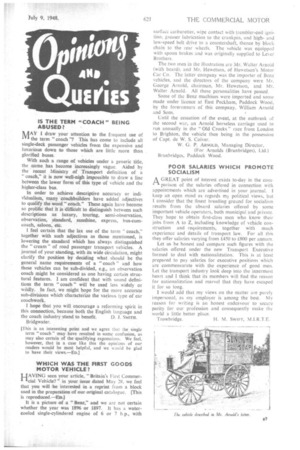MAY I draw your attention to the frequent use of
Page 41

If you've noticed an error in this article please click here to report it so we can fix it.
"I the term " coach"? This has come to include all single-deck passenger vehicles from the expensive and luxurious down to those which are little more than glorified buses.
With such a range of vehicles under a generic title, the name has become increasingly vague. Aided by the recent Ministry of Transport definition of a "coach," it is now well-nigh impossible to draw a line between the lower form of this type of vehicle and the higher-class bus.
In order to achieve descriptive accuracy or indiVidualistn, many coachbuilders have added adjectives to qualify the word " coach." These again have become so prolific that it is difficult to distinguish between such descriptions as luxury, touring, semi-observation, observation, ,standard, sunshine, express, bus-cumcoach, saloon, etc.
I feel certain that the lax use of the term "coach," together with such adjectives as those mentioned, is lowering the standard which has always distinguished the "cream" of road passenger transport vehicles. A journal of your standing, with its wide circulation, might clarify the position by deciding what . should be the general name requirements of a "coach" and how these vehicles can be sub-divided, e.g., an observation coach might be considered as one having certain structural features. I am confident that with sound definitions the term "coach" will be used less widely or wildly. In fact, we might hope for the more accurate sub-divisions which characterize the various type of car coachwork.
I hope that you will encourage a reforming spirit in this connection, because both the English language and
the coach industry, stand to benefit. D. J. SMITH. Bridgwater.
[This is an interesting point and we agree that the single term " coach " may have resulted in -some confusion, as may also certain of the qualifying expressions. We feel, however, that in a case like this the opinions of our readers would be most helpful, and we would be glad to have their views—En,] WHICH WAS THE RRST GOODS MOTOR VEHICLE?
HAVING seen your article, "Britain's First Commercial Vehicle?" in your issue dated May 28, we feel that you will be interested in a reprint from a block used in the preparation of our original catalogue. [This is reproduced.—'Ea.] It is a picture of a "Benz," and we are not certain whether the year was 1896 or 1897. It has a watercooled single-cylindered engine of 6 or 7 h.p., with surface carburetter, wipe contact with trembler-coil ignition, greaser lubrication to the crankpin, and highand low-speed belt drive to a countershaft, thence by block chain to the rear wheels. The vehicle was equipped with spoon brakes and was originally supplied to Lever Brothers.
The two men in the illustration are Mr. Walter Arnold (with beard), and Mr. Hewetson, of Hewetson's Motor Car Co. The latter company was the importer of Benz vehicles, and the directors of the company were Mr. George Arnold, chairman, Mr. Hewetson, and Mr. Walter Arnold. All these personalities have passed.
Some of the Benz machines were imported and some made under licence at East Peckham, Paddock Wood, by the forerunners of this company, William Arnold and Sons.
Until the cessation of the event, at the outbreak of the second war, an Arnold horseless carriage used to run annually in the " Old Crocks" race from London to Brighton, the vehicle then being in the possession of Capt. de W. S. Colver.
W. G. P. ARNOLD, Managing Director, (For Arnolds (Branbridges), Ltd.) Branbridges, Paddock Wood.
. POOR SALARIES WHICH PROMOTE SOCIALISM AGREAT point of interest exists to-day in the coinparison of the salaries offered in connection witk appointments which are advertised in your journal. I keep an open mind as regards my political views, but I consider that the finest breeding ground for socialism results from the absurd salaries offered by some important vehicle operators, both municipal and private. They hope to obtain first-class men who know their jobs from A to Z, including knowledge of vehicle construction and requirements, together with much experience and details of transport law. For all this they offer salaries varying from £450 to £800 per annum.
Let us be honest and compare such figures with the salaries offered under the new Transport Executive formed to deal with nationalization. This is at least prepared to pay salaries for executive positions which are commensurate with the experience of good men. Let the transport industry look deep into the innermost heart and I think that its members will find the reason for nationalization and marvel that they have escaped it for so long.
I would add that my views on the matter are purely impersonal, as my employer is among the best. My reason for writing is an honest endeavour to secure parity for our profession and consequently make the world a little better place.
Trowbridge. H. M. Swurr, M.I.R.T.E.




















































































